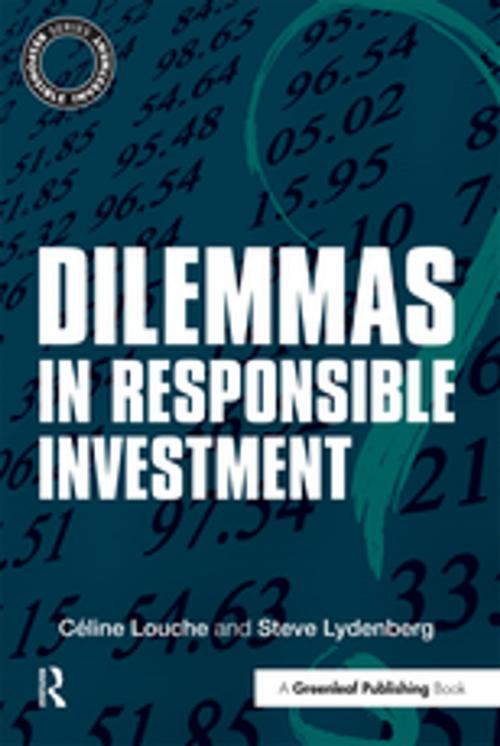Dilemmas in Responsible Investment
Business & Finance, Business Reference, Business Ethics, Finance & Investing, Investments & Securities| Author: | Céline Louche, Steve Lydenberg | ISBN: | 9781351278423 |
| Publisher: | Taylor and Francis | Publication: | September 8, 2017 |
| Imprint: | Routledge | Language: | English |
| Author: | Céline Louche, Steve Lydenberg |
| ISBN: | 9781351278423 |
| Publisher: | Taylor and Francis |
| Publication: | September 8, 2017 |
| Imprint: | Routledge |
| Language: | English |
Imagine that you are a responsible investment money manager. One of your clients is asking you to sell her holdings in a company because it has been accused in the press of contracting with suppliers that have abusive labour conditions. You have to evaluate and benchmark the CSR performance of a number of companies from the same industry but among them there are companies, primarily the smallest, that provide little or no CSR information. One of your major clients is asking you to exclude companies involved in nanotechnology What would you do? Responsible investment (RI) – the integration of environmental, societal and governance (ESG) issues into investment decision-making – can be difficult and complex. Including or excluding companies, engaging with companies, partnering with stakeholders, evaluating environmental and societal controversies, defining criteria and, all the while, producing a competitive return for investors can raise multiple questions that cannot be dealt with simply. The practice of RI faces many such dilemmas as it seeks to balance the competing goals of business, society, and finance and to judge how best to reconcile what are often conflicting concerns.
Dilemmas in Responsible Investment examines the problems responsible investment practitioners face daily. It emphasises the importance of asking the right questions as well as getting the right answers; and the importance of process as well as product. The authors pay attention to the diversity of opinion and variety of approaches available. They also raise fundamental questions about the very purpose of investment and the responsibilities of investors, both economic and societal.
Although dilemmas in RI are not always easily resolved, Louche and Lydenberg believe that they are also a source of valuable and necessary debate about the appropriate role of corporations in society and the ability of the financial markets to appropriately serve the societies in which they operate. Such dilemmas provide a valuable framework for public debate and can encourage the emergence of innovative answers and approaches. Responsible investors join in these debates when they examine the societal and environmental implications of business activities, actions and behaviour Facilitate dialogue between corporations and their stakeholders Encourage corporate transparency on societal and environmental issues Reward companies that are making genuine efforts towards sustainability Integrate societal and environmental data into financial analysis.
The book first of all provides a state-of-the-art overview of responsible investment, its history and development, explanations of key terms and a guide to the different actors involved in the field. Second, it presents 12 diverse hypothetical case studies that examine a wide spectrum of the challenges facing RI professionals, raising questions about the relationship between business and society, about the purpose of investment, and about the responsibilities of investors to various segments of society and the environment. The (often interconnected) cases present a dilemma, possible approaches available, variable factors, a variety of quotations and suggested responses from 35 leading professionals in the responsible investment community, real-world examples and comparisons and recommendations.
Accessible, vivid and illuminating, Dilemmas in Responsible Investment is the first book specifically written for teaching and professional training in responsible investment. It will be required reading for students, academics and practitioners in the areas of finance, ethics and CSR.
Imagine that you are a responsible investment money manager. One of your clients is asking you to sell her holdings in a company because it has been accused in the press of contracting with suppliers that have abusive labour conditions. You have to evaluate and benchmark the CSR performance of a number of companies from the same industry but among them there are companies, primarily the smallest, that provide little or no CSR information. One of your major clients is asking you to exclude companies involved in nanotechnology What would you do? Responsible investment (RI) – the integration of environmental, societal and governance (ESG) issues into investment decision-making – can be difficult and complex. Including or excluding companies, engaging with companies, partnering with stakeholders, evaluating environmental and societal controversies, defining criteria and, all the while, producing a competitive return for investors can raise multiple questions that cannot be dealt with simply. The practice of RI faces many such dilemmas as it seeks to balance the competing goals of business, society, and finance and to judge how best to reconcile what are often conflicting concerns.
Dilemmas in Responsible Investment examines the problems responsible investment practitioners face daily. It emphasises the importance of asking the right questions as well as getting the right answers; and the importance of process as well as product. The authors pay attention to the diversity of opinion and variety of approaches available. They also raise fundamental questions about the very purpose of investment and the responsibilities of investors, both economic and societal.
Although dilemmas in RI are not always easily resolved, Louche and Lydenberg believe that they are also a source of valuable and necessary debate about the appropriate role of corporations in society and the ability of the financial markets to appropriately serve the societies in which they operate. Such dilemmas provide a valuable framework for public debate and can encourage the emergence of innovative answers and approaches. Responsible investors join in these debates when they examine the societal and environmental implications of business activities, actions and behaviour Facilitate dialogue between corporations and their stakeholders Encourage corporate transparency on societal and environmental issues Reward companies that are making genuine efforts towards sustainability Integrate societal and environmental data into financial analysis.
The book first of all provides a state-of-the-art overview of responsible investment, its history and development, explanations of key terms and a guide to the different actors involved in the field. Second, it presents 12 diverse hypothetical case studies that examine a wide spectrum of the challenges facing RI professionals, raising questions about the relationship between business and society, about the purpose of investment, and about the responsibilities of investors to various segments of society and the environment. The (often interconnected) cases present a dilemma, possible approaches available, variable factors, a variety of quotations and suggested responses from 35 leading professionals in the responsible investment community, real-world examples and comparisons and recommendations.
Accessible, vivid and illuminating, Dilemmas in Responsible Investment is the first book specifically written for teaching and professional training in responsible investment. It will be required reading for students, academics and practitioners in the areas of finance, ethics and CSR.















